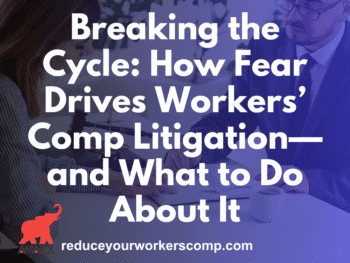How Would You Decide: Can uninsured employer seek contribution/indemnity from third part to recover losses paid in wrongful death action filed by employee’s widow? Here’s what Tom Robinson, J.D., writer for Lexis Nexis Workers Comp Law Center reports. Here’s What Happened An employer purchased a used posthole digger for use in its operations. While using the posthole digger and tractor to do fencing work, an employee became entangled in the auger blade and died as a result of his injuries. When the employee’s widow sought workers’ compensation benefits, it was determined that the employer was not enrolled in a workers’ compensation plan at the time of the employee’s death. As a result, the state uninsured employers’ fund paid the widow’s claim. The state then sought reimbursement against the employer for the sums paid. The widow subsequently filed a wrongful death action against the employer and others in the U.S. District Court. The employer ultimately settled the case with the widow, paid settlement monies (through an insurance carrier), and then sought to recover from the posthole manufacturer via an alternative claim of contribution or indemnity. The U.S. District Court certified the following question (as amended) to the Supreme Court of Montana: “Is an uninsured employer prohibited from bringing either a contribution claim or an indemnity claim against a third party after settling with the injured employee?” Here’s What The Court Decided: In State Farm Fire & Cas. Co. v. Bush Hog, LLC, 2009 MT 349, 2009 Mont. LEXIS 500 (Oct. 21, 2009), the Supreme Court of Montana answered, “Yes.” Acknowledging first that in Montana, the right to contribution was established by statute, while the right to indemnity was an equitable principle, the Court indicated that the two concepts had essentially the same purpose: to shift one’s losses to another. The doctrine of contribution is to allocate liability among all responsible parties whereas the doctrine of indemnity springs from the equitable theory that one has been compelled to pay for damages caused by another. The Supreme Court agreed with the manufacturer that it was not equitable to require a stranger to the employer-employee relationship to indemnity an employer for liability that was wholly avoidable if the employer had simply obeyed the Workers’ Compensation Act and provided coverage for its employees. But for the employer’s failure to provide workers’ compensation coverage to the employee, the employer would have had no liability to the employee’s widow. The essence of the contribution/indemnity claim was directly attributable to the employer’s own violation of the workers’ compensation laws of the State. The Court concluded that allowing an action for contribution or indemnity would relieve an uninsured employer of the responsibility and consequences of its own violation. (workersxzcompxzkit) See generally Larson’s Workers’ Compensation Law, §§ 102.02, 118.01, 120.01, 120.04. Tom Robinson, J.D. is the primary upkeep writer for Larson’s Workers’ Compensation Law (LexisNexis) and Larson’s Workers’ Compensation, Desk Edition (LexisNexis). He is a contributing writer for California Compensation Cases (LexisNexis) and Benefits Review Board – Longshore Reporter(LexisNexis), and is a contributing author to New York Workers’ Compensation Handbook(LexisNexis). Robinson is an authority in the area of workers’ compensation and we are happy to have him as a Guest Contributor to Workers’ Comp Kit Blog. Tom can be reached at: compwriter@gmail.com. http://law.lexisnexis.com/practiceareas/Workers-Compensation We accept articles! Contact us at: Info@WorkersCompKit.com.
Dangerous Farm Equipment Kills Employee: Employer Does Not have Workers Compensation So Widow Seeks Third Party Recovery
Use our tools FREE WC IQ Test: http://www.workerscompkit.com/intro/ WC Books: http://www.reduceyourworkerscomp.com/workers-comp-books-manuals.php TD Calculator: www.ReduceYourWorkersComp.com/transitional-duty-cost-calculator.php
Do not use this information without independent verification. All state laws vary. You should consult with your insurance broker about workers’ comp issues.
©2009 Amaxx Risk Solutions, Inc. All rights reserved under International Copyright Law. If you would like permission to reprint this material, contact Info@WorkersCompKit.com



























